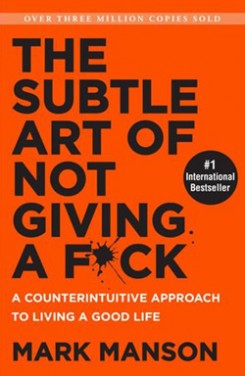The Subtle Art of Not Giving a F*ck
- Author: Mark Manson
- Fiction / non: Fiction
- Recent / classic: Recent release
- Primary Category: Self-help
- Additional categories: Self-help, Philosophy, Psychology
This book would appeal to you if
This book would appeal to you if you are looking for a new approach to your problems; if you’re interested in self-help/psychology; if you like a bit of irreverence; if you’re open to new ideas and ways of thinking; if you’re sick and tired of hearing about the power of positive thinking!
You probably wouldn't like this book if
you’re offended by swearing
The key themes of this book are
The key themes of this book are
Be yourself
Suffering is inevitable
You are responsible for your life choices
Evaluate your life and work out what really has meaning for you
Challenge yourself
The intended audience for this book is people who are looking for a distinct alternative to your average self-help book!
The writing style is
irreverent, direct, witty and amusing, and anecdotal.This book is recommended as therapy because
it is easily accessible and humorous. It is ideal for anyone who is having an existential crisis or who is seeking to make changes to their life.
Quotes
‘Highs come in many forms. Whether it’s a substance like alcohol, the moral righteousness that comes from blaming others, or the thrill of some new risky adventure, highs are shallow and unproductive ways to go about one’s life. Much of the self-help world is predicated on peddling highs to people rather than solving legitimate problems. Many self-help gurus teach you new forms of denial and pump you up with exercises that feel good in the short term, while ignoring the underlying issue. Remember, nobody who is actually happy has to stand in front of a mirror and tell himself that he’s happy.’ Page 33
‘Our lives today are filled with information from the extremes of the bell curve of human experience, because in the media business that’s what gets eyeballs, and eyeballs bring dollars. That’s the bottom line. Yet the vast majority of life resides in the humdrum middle. The vast majority of life is unextraordinary, indeed quite average.
This flood of extreme information has conditioned us to believe that exceptionalism is the new normal. And because we’re all quite average most of the time, the deluge of exceptional information drives us to feel pretty damn insecure and desperate, because clearly we are somehow not good enough. So more and more we feel the need to compensate through entitlement and addiction. We cope the only way we know how: either through self-aggrandizing or through other-aggrandizing.’ Page 58
‘Just as we look back in horror at the lives of people five hundred years ago, I imagine people five hundred years from now will laugh at us and our certainties today. They will laugh at how we let our money and our jobs define our lives. They will laugh at how we were afraid to show appreciation for those who matter to us most, yet heaped praise on public figures who didn’t deserve anything. They will laugh at our rituals and superstitions, our worries and our wars; they will gawk at our cruelty. They will study our art and argue over our history. They will understand truths about us of which none of us are aware.
And yet they, too, will be wrong. Just less wrong than we are.’ Page 122
‘Our values are imperfect and incomplete, and to assume that they are perfect and complete is to put us in a dangerously dogmatic mindset that breeds entitlement and avoids responsibility. The only way to solve our problems is to first admit that our actions and beliefs up until this point have been wrong and are not working.
This openness to being wrong must exist for any real growth or change to take place.
‘Manson’s law of avoidance states: ‘The more something threatens your identity, the more you will avoid it.’ … There’s a certain comfort that comes from knowing how you fit in the world. Anything that shakes up that comfort—even if it could potentially make your life better—is inherently scary.’ Pages 134–135
Action -> Inspiration -> Motivation
‘If you lack the motivation to make an important change in your life, do something—anything, really—and then harness your reaction to that action as a way to begin motivating yourself.’ Page 159
‘The author Tim Ferriss relates a story he once heard about a novelist who had written over seventy novels. Someone asked the novelist how he was able to write so consistently and remain inspired and motivated. He replied, “Two hundred crappy words per day, that’s it.” The idea was that if he forced himself to write two hundred crappy words, more often than not, the act of writing would inspire him; and before he knew it, he’d have thousands of words down on the page.
If we follow the “do something” principal, failure feels unimportant. When the standard of success becomes merely acting—then when any result is regarded as progress and important, when inspiration is seen as a reward rather than a prerequisite—we propel ourselves ahead. We feel free to fail, and that failure moves us forward.
The “do something” principle not only helps us overcome procrastination, but it’s also the process by which we adopt new values. If you’re in the midst of an existential shitstorm and everything feels meaningless—if all the ways you used to measure yourself have come up short and you have no idea what’s next, if you know you’ve been hurting yourself chasing false dreams, or if you know that there’s some better metric you should be measuring yourself with but you don’t know how—the answer is still the same:
Do something.’
Pages 160–161

